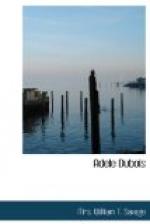It happened that a stranger came to pass a night at his, house. During the conversation of a long winter evening, his curiosity became greatly excited, in an account, given by his guest, of the Miramichi region. He was astonished at the moral darkness reigning there. The place was distant, and, at that time, almost inaccessible to any, save the strong and hardy. But the light of life ought to be thrown into that darkness. Who should go as a torch-bearer? The inquiry had scarcely risen in his breast, before he thought he heard the words spoken almost audibly, Thou must go.
Here, a peculiarity of the good blacksmith must be explained. Possessed of great practical wisdom and sagacity, he was yet easily affected by preternatural influences. He was subject to very strong “impressions of mind”, as he called them, by which he was urged to pursue one course of conduct instead of another; to follow out one plan of business in preference to another, even when there seemed to be no apparent reason, why the one course was better than its alternative. He had sometimes obeyed these impressions, sometimes had not. But he thought he had found, in the end, that he should have invariably followed them.
A particular instance confirmed him in this belief. One day, being in New York, he was extremely anxious to complete his business in order to take passage home in a sloop, announced to leave port at a certain hour in the afternoon. Resolving to be on board the vessel at the time appointed, he hurried from place to place, from street to street, in the accomplishment of his plan. But he was strangely hindered in his arrangements and haunted by an impression of trouble connected with the vessel. Having, however, left his wife ill at home, and being still determined to go, he pressed on. It happened that he arrived at the wharf just as the sloop had got beyond the possibility of reaching her, and he turned away bitterly disappointed. The night that followed was one of darkness and horror; the sloop caught fire and all on board perished.
He had now received an impression that it was his duty to go, as an ambassador of Christ, to Miramichi.
Having for sometime previous, “exercised his gift” with acceptance at various social religious meetings, he applied to the authorities of his religious denomination for license to preach.
After passing a creditable examination on points deemed essential in the case, he obtained a commission and a cordial God speed from his brethren. They augured well for his success.
To be sure, the deficiencies of his early education sometimes made themselves manifest, notwithstanding the diligent efforts he had put forth, of late years, to remedy the lack. But on the other hand, he had knowledge of human nature, sagacity in adapting means to ends, a wide tolerance of those unfortunate ones, involved by whatever ways in guilt, deep and earnest piety, and a remarkable natural eloquence, both winning and forcible.




